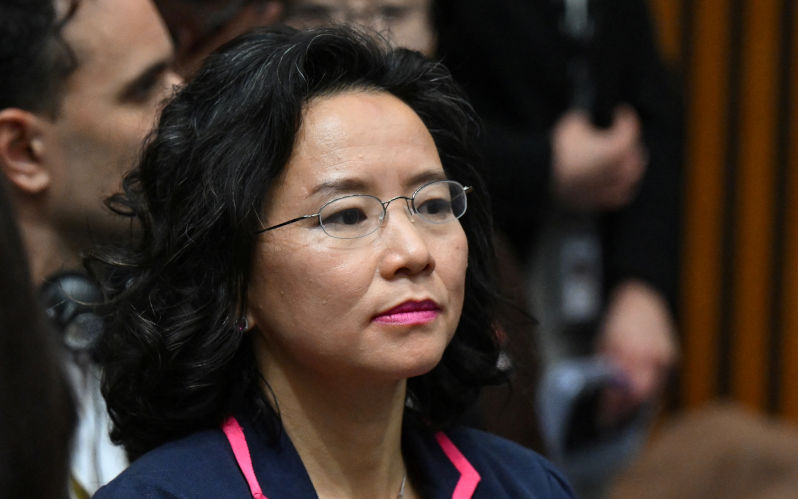Australian journalist Cheng Lei says China bashing ‘worrying’
July 13, 2024
Cheng Lei, who was imprisoned in China for three years, says Australians should not overreact over every bilateral issue with Beijing.
Freed Australian journalist Cheng Lei, who was imprisoned in Beijing for three years, has urged Australians to avoid taking simplistic or extreme views about China.
The former anchor at Chinese state-run TV network CGTN said there were two sides of China and that both it and Australia must engage and understand each other, she said in an interview with the Australia-China Relations Institute in Sydney this week.
The Chinese-born journalist said she would consider going back to China but only if she felt safe enough and welcomed.
If China were to become a “dirty word” in Australia, Chinese Australians living in Australia who still have family and business interests in China would suffer, Cheng said. Cheng returned to Australia last October after she was locked up by Beijing for breaking a government-imposed embargo.
“When I was blocked from view at the Canberra Press event, people [were] saying, ‘We should stop trade with China because Cheng Lei was blocked’,” she said, referring to the highly publicised media coverage of Chinese officials’ apparent attempt to block Cheng’s view of Chinese Premier Li Qiang during his visit to Canberra last month.
“The extreme [Australian] views that are held about China, the fearmongering, the laziness to think and to read and really understand and engage with people whose views you don’t agree with. That’s really worrying.”
She said in China, the Chinese knew a lot more about Australia than Australians about China.
Nick Coyle, Cheng’s partner and former chief executive of the Australian Chamber of Commerce in Beijing, who also spoke at the interview, said it was important that Australia become adept at “walking and chewing gum” over its relationship with China.
Particularly, it was important for the Australian media and the political class not to overreact or “score political points” at every issue that surfaced between the two nations, he added.
Both agreed there was little nuance in the Australian media’s coverage of China which was “far too binary”.
“[It’s] hug the panda or mug the panda,” Cheng said.
“For the media, they’ll have their go-to persons. This person is anti-China, I’ll just interview this person. This person is pro-China, and you don’t always get the full picture if you don’t talk to people who can be quite holistic in their views on China.”
When asked if she felt any bitterness about China after her recent detention, Cheng said while China had deep-seated problems such as freedom of expression, it also embodied a lot of “beauty”.
Australian journalist Cheng Lei in first interview since release from China detention
“When it comes to China, it just evokes so many feelings in me because I’m a very sentimental person and China represents so much, and we all have hopes for people to get along, for beauty to be appreciated,” she said.
“So it’s very complicated, and ask any Chinese person living in Australia, there are things that they miss intensely, that they long for, that they try to replicate here. And there are things that they hate and want to escape, and it’s all a matter of calculus.”
At the same time, it was also important that people were conscious about not being “seduced” by glossy depictions of China, she added.
Remembering her detention, Cheng said she was aggrieved she could not help her Chinese “cellmates” and felt anger that Beijing treated its people far worse than she experienced.
Patriotism among the Chinese towards their country has waned over the years, in particular among those from Hong Kong and Taiwan, she said.
With Taiwan, there were plenty of theories on the mainland that Chinese President Xi Jinping might want to take over Taiwan by 2027 during the 100th anniversary of the formation of China’s People’s Liberation Army, Cheng said. At the same time, there were also expectations the ambiguities over reunification would continue, she added. China has talked about reunification with Taiwan for more than 70 years.
Beijing views Taiwan as a renegade province that should be reintegrated into mainland control, by force if necessary. While many nations, including the US, do not officially acknowledge Taiwan as an independent state, they oppose any use of force to alter the existing status quo.
The word on the streets was that China’s defence forces were “a mess”, said Cheng, adding that the Chinese were not united over the Taiwan issue.
“If you ask ordinary Chinese people who have been brainwashed, including myself when I was in primary school in China, is Taiwan part of China? I think most will probably say yes. But if you ask, should China overtake or take over Taiwan by military means, I think you’ll get a much smaller number,” she said.
Republished from The South China Morning Post, July 5, 2024
